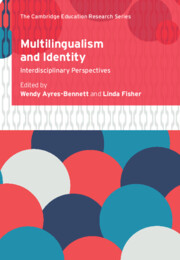Book contents
- Multilingualism and Identity
- Multilingualism and Identity
- Copyright page
- Contents
- Figures
- Tables
- Contributors
- 1 Towards Interdisciplinarity in Multilingual Identity Research
- Part I Situated Multilingualism and Identity
- Part II Multilingual Identity Practices
- 8 Decolonizing Languages in Rural Settings
- 9 Seeking Methodological Rigour in Language and Identity Research
- 10 Translation, Identity and Translanguaging
- 11 The Complexity of Identities
- 12 Narrating Heterogeneous Identities in Multilingual Communities
- Part III Multilingual Identity and Investment
- References
- Index
10 - Translation, Identity and Translanguaging
Perspectives from a Global Literacy Initiative
from Part II - Multilingual Identity Practices
Published online by Cambridge University Press: 22 July 2022
- Multilingualism and Identity
- Multilingualism and Identity
- Copyright page
- Contents
- Figures
- Tables
- Contributors
- 1 Towards Interdisciplinarity in Multilingual Identity Research
- Part I Situated Multilingualism and Identity
- Part II Multilingual Identity Practices
- 8 Decolonizing Languages in Rural Settings
- 9 Seeking Methodological Rigour in Language and Identity Research
- 10 Translation, Identity and Translanguaging
- 11 The Complexity of Identities
- 12 Narrating Heterogeneous Identities in Multilingual Communities
- Part III Multilingual Identity and Investment
- References
- Index
Summary
Cross-disciplinary research in recent years on the intersections between both translation and translanguaging and translation and identity has sought to emphasize the diverse multilingual practices of translators while acknowledging the agency of translators in negotiating power and meaning, and foregrounding the often marginalized practice of translation itself as a creative and multiply boundary-crossing activity. In this chapter, we review current research on translation, translanguaging, and identity in order to better understand the ways that identity is operationalized in multilingual and collaborative translation practice; propose a new model of translator identity that addresses the diversity and collaborative nature of much translation work; analyze multilingual translator identity in practice by highlighting two examples of collaborative translation data from a global multilingual literacy project; and make the case that recognition of the multifaceted, translingual practices of translation, together with our enhanced model of translator identity, may help reconcile divergent understandings of translanguaging and the role of the translator across disciplinary boundaries.
- Type
- Chapter
- Information
- Multilingualism and IdentityInterdisciplinary Perspectives, pp. 201 - 220Publisher: Cambridge University PressPrint publication year: 2022



